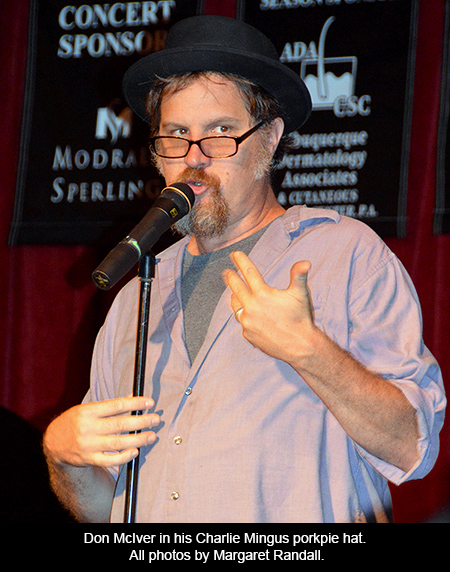
As big and successful as the New Mexico Jazz Festival always is—filling venues in Albuquerque and Santa Fe for nine years now, bringing in some contemporary greats and treating us to their musical genius indoors and out, in perfect acoustical spaces as well as on open air stages—its closing event possesses a magic all its own. Jazz and poetry. Poetry and Jazz. Two creative genres made for each other. At the Outpost Performance Space on Sunday, July 27th, the experience was like no other.
For a couple of years now, Albuquerque poet Don McIver has organized a free afternoon devoted to this magical combination. It happens on the Festival’s last day. The event was free, and when news travels I’ll be willing to bet many Albuquerqueans who didn’t attend will wish they had. There was a decent audience, though, and everyone came away wrapped in the satisfying mind and body glow produced when poets and musicians work together seamlessly.
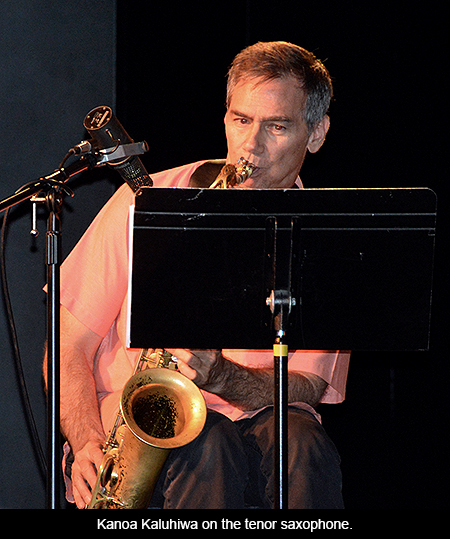
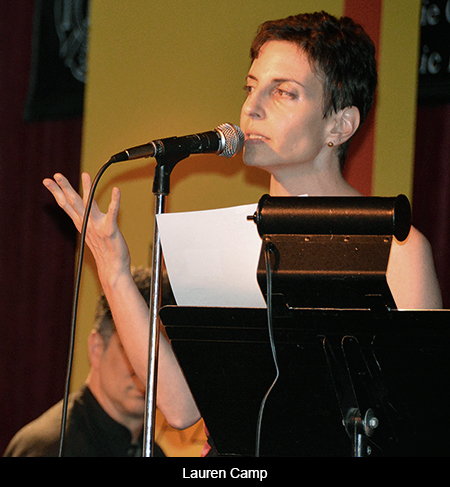
Moments after I arrived, someone pointed out A. B. Spellman, sitting toward the back of the auditorium thumbing through pages of poems. Instantly I was transported back more than half a century to the late 1950s, to the streets of New York’s Lower East Side where Spellman and I made our first forays into the world of jazz. We didn’t know each other well (I’ll confess to having been one of the “trillion women” he never slept with, according to a marvelous poem he read at the event). But he was already a fixture on that scene, and we must have shared club space or sidewalks on dozens of occasions.
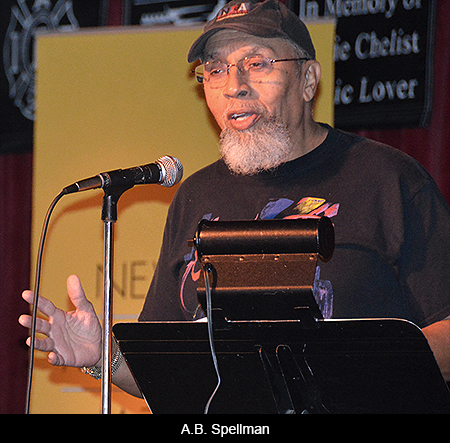
I hadn’t run into Spellman since that long-ago time, and for me his presence evoked Thelonious Monk at The Jazz Gallery and Ornette Coleman at The Five Spot. Or better yet, occasional nights that turned into days and then nights and days again in some of the private lofts where those who would one day be famous improvised at endless sessions where the rest of us just felt like we were lucky enough to inhabit the center of the world. Even when someone from one’s past was only an acquaintance, a chance reconnection such as this can recreate a time and a place in all its magical intensity.
At the Outpost, the house ensemble was marvelous: Asher Barreras on bass, Kanoa Kaluhiwa on tenor sax, John Rangel on piano, John Maestas on guitar, and Diego Arencon on drums. And they played marvelously with each of the poets. Reading or reciting to music, especially live music, can be daunting. The poet sometimes can’t hear his or her own voice over the sound of the instruments. It can feel like cruel competition. Except if it works, which was the case in every one of Sunday’s performances. This wasn’t competition, but collaboration—of the highest order, due to the Outpost’s excellent sound system and the brilliant sensitivity of the musicians.
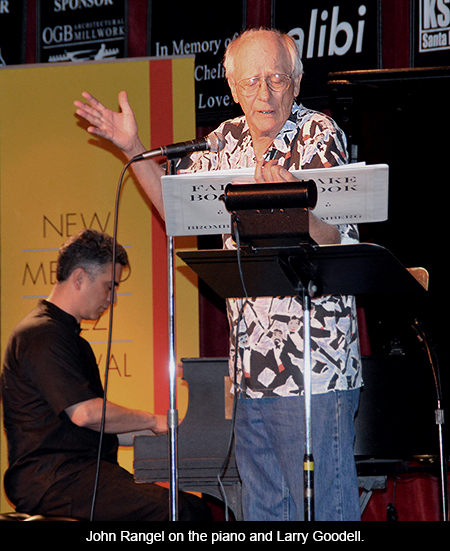
Larry Goodell was first up with a poem about growing up in Roswell, New Mexico, where poetry and other artistic genres saved him from the misery of the high school sports that weren’t for him. Everyone who knows Larry’s work appreciates the way it embraces, fully and passionately, what could have been and what is. Lauren Camp’s precise measured lines spoke her deep knowledge of this musical form, one that also informs pieces of her fabric art showcasing some of the jazz greats. Jazz and its creators have been a leitmotif throughout all genres of Camp’s work.
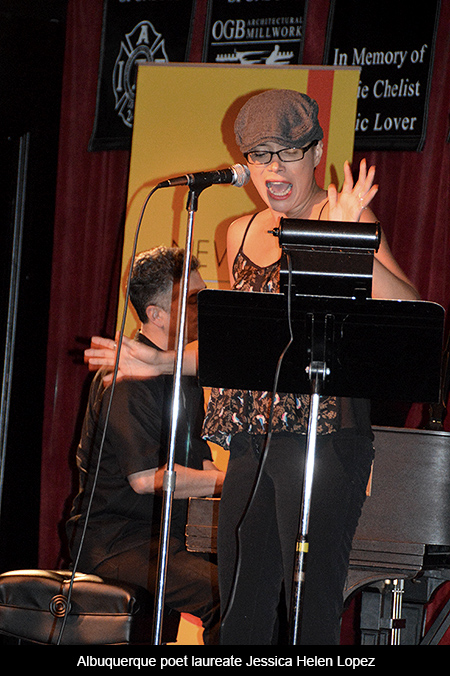
Albuquerque’s new poet laureate, Jessica Helen Lopez, seduced us with her “Take Five.” McIver and Carlos Contreras also contributed strong pieces.
But for me the afternoon’s highlight came when V.B. Price read his long poem to Albuquerque’s own John Lewis. The ensemble played “Afternoon in Paris,” memorably recorded in 1957 by Lewis and The Modern Jazz Quartet. Lewis, who grew up in our city’s South Broadway neighborhood, was the MJQ’s musical director. But long before that he’d played with a Boy Scout band here in town and earned 50 cents a performance on Sunday mornings playing in various churches. All this, and more, can be found in Price’s moving evocation of Lewis in his July 28th “Provincial Matters” in this publication. At the Outpost Lewis came alive in Price’s poem, perfectly rendered against the backdrop of this iconic piece. Price hit his poetic evocation of Lewis perfectly.
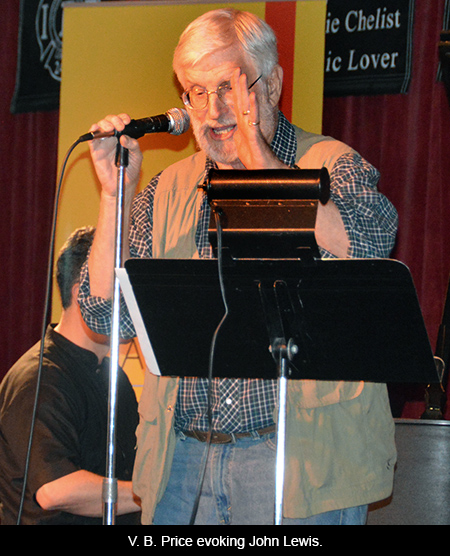
Equally wonderful was A.B. Spellman who, because he hadn’t been able to rehearse with the ensemble chose to read acapella. Still, there was some wise old music in his voice, as he gave us a poem that laughs at the compulsion everyone seems to have these days to write a tell-all memoir; and another that riffs on César Vallejo’s “Black Stone on a White Stone.” I wonder how many poets since the great Peruvian have taken that poem as inspiration for one of theirs. In Vallejo’s original, the lines: “I will die in Paris in a rainstorm, /on a day I already remember, / I will die in Paris—and I’m not afraid— / in autumn and perhaps on a Thursday, like today,” echo through time and space. Spellman’s version envisions his death in Havana in a tornado.
Hats off to Don McIver and Tom Guralnick. Don because he came up with a beautiful selection of poets who complimented each other well, and organized the spoken word part of the event. Tom because he found the musicians and put the Outpost’s considerable resources behind its success. Don’s black porkpie hat, reminiscent of Charlie Mingus, provided an added touch to a performance in which such warm informal details combined with great talent to make everyone fortunate enough to have been there feel immensely privileged. This was Albuquerque artistic brilliance at its best.
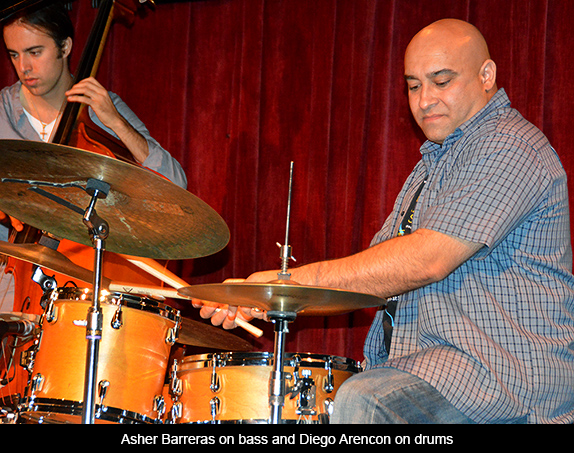

July 30, 2014